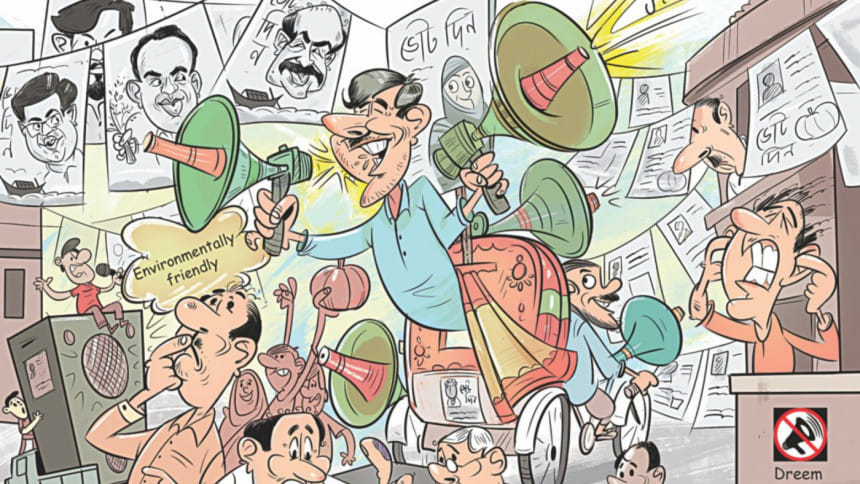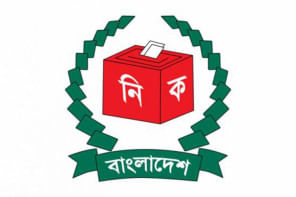I’ve no idea who these candidates are, but they surely sell hard

If the heavens are kind this time and everything pans out as expected by the mayoral wannabes, a golden age for Dhaka is now within reach. So mark your calendar for February 1, the day your beloved city goes into labour and gives birth to a new pair of mayors to look after its two wings for the next five years. Whether you're a voter or not, whether you believe in electoral pledges or not, whether you abhor giant leaps of faith or not, whether you're weary of the routineness of it all or not—you must love the sound coming out of the campaign trail at the moment.
Welcome to Dhaka 2.0—or as Sheikh Fazle Noor Taposh would like to call it, "New City", or Atiqul Islam, "Smart City", or Tabith Awal, "Intelligent City", or Ishraq Hossain, "World-Class Metropolis". Meet the four visionaries behind Dhaka's rebirth, aka the four frontrunners in the mayoral race backed respectively by Awami League and BNP in the two wings of the city. The candidates may sort out the nomenclature between them if they want but let us take a look at their vision for the city's planned transformation. It's chaotic, somewhat unreal, but oddly beautiful. It's easier to imagine this picture in terms of Cubist shards: a flash of a clear sky; glimpses of people roaming around freed-up lakes and canals; clean, spacious roads; "smart" neighbourhoods; electric buses running through the city; public toilets at every corner; multi-storeyed parking complexes dotting the downtown; basic civic facilities for all; one-stop service for all certificates and trade licences; community centres and gymnasiums in each ward; skywalks; footbridges with escalators; basically, a state within a state where everyone is safe, healthy and picture-perfect.
In the Dhaka of our Fantastic Four, there is no corruption, no traffic, no air pollution, no water-logging, no mosquito—zilch.
To be frank, I have no idea who these candidates are. Beyond the obvious highlights forced down my throat every time I watch TV or read a newspaper, my knowledge about our potential city fathers is that of a toddler about his toys, with little background information. The four candidates are well-bred and well-educated, I am told, all coming off as equally electable and competent to take up the challenge. I see pictures and videos showing them on the streets, approaching people with a warm smile and a list of deliverables. Whatever they're selling—through their leaflets and manifestos, their rallies, their door-to-door campaigns, their live videos, the promotional tracks that keep blaring in the street, collapsing the sense of space and perspective—they surely sell hard. They make you take notice.
As for their merchandise—a golden age for Dhaka—I remain eternally enthused. I remember writing an op-ed about the city of my dream which shares some of the elements of their dream city, but I must admit, mine pales in comparison to the glitz and glamour that they plan to bring to this city. It may seem like a modern-day utopia or a sensory overload for the unaccustomed brains of residents, but the four seem to think it is possible, although they are scant on details about why they think so. Come February, this fantasyland will be ours to ravage and exploit as we wish, right?
Let's entertain this thought for a while before we move on to a more sobering question: will the heavens be so kind as to allow our mayors to remember their pledges once the honeymoon period is over and actually do something about them? An even more sobering question is: can the mayors, who are executive heads of the city corporations, do something even if they want to given their pathetic lack of power and jurisdiction over the forty-plus government bodies and organisations that basically run the city? One candidate has floated the idea of a metropolitan government system. Given how Dhaka has expanded over the years and its myriad problems that keep piling up, perhaps the time is right for a radical reform in how the city is run. But can a mayor do that? There is no denying that democracy in Bangladesh has had a rough go of it lately, leading to a profound distrust of any political commitment. If there is cynicism about the magical sound bites coming out of the campaign trail of the mayoral candidates, it is precisely because of that. And other obvious reasons as stated above.
"An even more sobering question is: can the mayors, who are executive heads of the city corporations, do something even if they want to given their pathetic lack of power and jurisdiction over the forty-plus government bodies and organisations that basically run the city? One candidate has floated the idea of a metropolitan government system. Given how Dhaka has expanded over the years and its myriad problems that keep piling up, perhaps the time is right for a radical reform in how the city is run. But can a mayor do that? There is no denying that democracy in Bangladesh has had a rough go of it lately, leading to a profound distrust of any political commitment. If there is cynicism about the magical sound bites coming out of the campaign trail of the mayoral candidates, it is precisely because of that.
Strangely enough, despite the apparent novelty of some of their ideas, they are basically reading from an old handbook. Almost everything they are saying has already been said. Too many times. By too many people. In too many city corporations. Clearly, the appeal has not faded yet. Many of these pledges were also on the agenda of the candidates in the first mayoral polls of a bifurcated Dhaka in 2015. It's as if progress in the mayoral brainwaves has stalled, frozen in time five years ago and impossible to add to, even as the city continues to be hit by new waves of problems and challenges. In the thirty years of the history of the city corporation system in Dhaka, every mayor came with the promise to make the city a better place but left it in a worse state than it was before, not for their own fault always. The gulf between the pledges made and the reality on the ground remains unbridged.
On my way home the other night, I was stopped by a tricycle-bound old man begging for alms. As I was about to talk to him, a campaign van of one of the candidates swept past me, with a pre-recorded message blaring from its loudspeakers. The message was an emotionally-charged invitation to the people to vote for him because he is loved by everyone, and only he, and no one else, can deliver. I was struck by the contrast between the two incidents of begging: one meant the difference between life and death, and the other used the pretence of knowingness to demand votes as a fast track to power. Dhaka can do without the latter; but it must address the condition of the former—for these poor, helpless people who have no stake in the glitz of a smart city are the ones by whom the health of a city is measured.
Badiuzzaman Bay is a member of the editorial team at The Daily Star.
Email: [email protected]






Comments